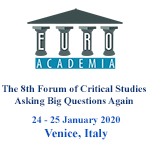Euroacademia Conferences
 Europe Inside-Out: Europe and Europeanness Exposed to Plural Observers (9th Edition) April 24 - 25, 2020
Europe Inside-Out: Europe and Europeanness Exposed to Plural Observers (9th Edition) April 24 - 25, 2020 Identities and Identifications: Politicized Uses of Collective Identities (9th Edition) June 12 - 13, 2020
Identities and Identifications: Politicized Uses of Collective Identities (9th Edition) June 12 - 13, 2020 8th Forum of Critical Studies: Asking Big Questions Again January 24 - 25, 2020
8th Forum of Critical Studies: Asking Big Questions Again January 24 - 25, 2020 Re-Inventing Eastern Europe (7th Edition) December 13 - 14, 2019
Re-Inventing Eastern Europe (7th Edition) December 13 - 14, 2019 The European Union and the Politicization of Europe (8th Edition) October 25 - 26, 2019
The European Union and the Politicization of Europe (8th Edition) October 25 - 26, 2019 Identities and Identifications: Politicized Uses of Collective Identities (8th Edition) June 28 - 29, 2019
Identities and Identifications: Politicized Uses of Collective Identities (8th Edition) June 28 - 29, 2019 The European Union and the Politicization of Europe (7th Edition) January 25 - 26, 2019
The European Union and the Politicization of Europe (7th Edition) January 25 - 26, 2019 7th Forum of Critical Studies: Asking Big Questions Again November 23 - 24, 2018
7th Forum of Critical Studies: Asking Big Questions Again November 23 - 24, 2018 Europe Inside-Out: Europe and Europeanness Exposed to Plural Observers (8th Edition) September 28 - 30, 2018
Europe Inside-Out: Europe and Europeanness Exposed to Plural Observers (8th Edition) September 28 - 30, 2018 Identities and Identifications: Politicized Uses of Collective Identities (7th Edition) June 14 - 15, 2018
Identities and Identifications: Politicized Uses of Collective Identities (7th Edition) June 14 - 15, 2018
Recurring of Enlightened Dark Ages: Rethinking the Discourse of Democracy through the Nietzschean Framework of the Death of God
-
-

-
Presentation speakers
- Junfu Wong, University of Cambridge, UK
Abstract:
Nietzsche (1886) accentuated the total collapse of the absolute truth through exclaiming the death of god. Since then, the position of god is suspended, the absolute truth of believing an unquestionable god becomes something of the benighted past, thereby should be removed or rejected. But such a reformist attempt is dangerous as the removal of religious beliefs of god actually causes a total forfeiture of beliefs that served as the engine for leading a purposive life. Postmodernism somehow fills this empty field by conversely laying an excessive amount of truths down to us, suggesting that all beliefs are righteous through taking a relativist perspective. Caputo (2013) recognized postmodern thought as a style that advises flexibility that reads all opinions as competing truths, depending solely upon your position. It thus becomes a continued philosophical quest of asking if there is still a possible standard of truth exists at the core of beliefs of people during the postmodern era. Serving as an attempt to answer this question, this paper aspires to argue that democracy gradually becomes an alienated kind of religious belief that serves as the absolute truth of the postmodern age for those political protesters. By believing that they are fighting for democracy, they are endorsed by a sense of dogmatic legitimacy to carry out their acts that they rendered as praiseworthy, by reframing them rhetorically as the search of freedom. Because of this, for the devoted believer of democracy, any challenges towards it are unacceptable as they are considered promptly as a transgression of the basic right of peoples. Following these premises, this paper aims at rethinking the discourse of democracy through contextualizing it under the prism of the death of god. It argues that democracy actually takes up the former position of the theist god, becoming a sophistic kind of truth that forms the belief of postmodernism.
-
Related Presentations

Enlightenment Reloaded: How to Become Better as Individuals and Humankind?
- Sandra Eleonore Johst













